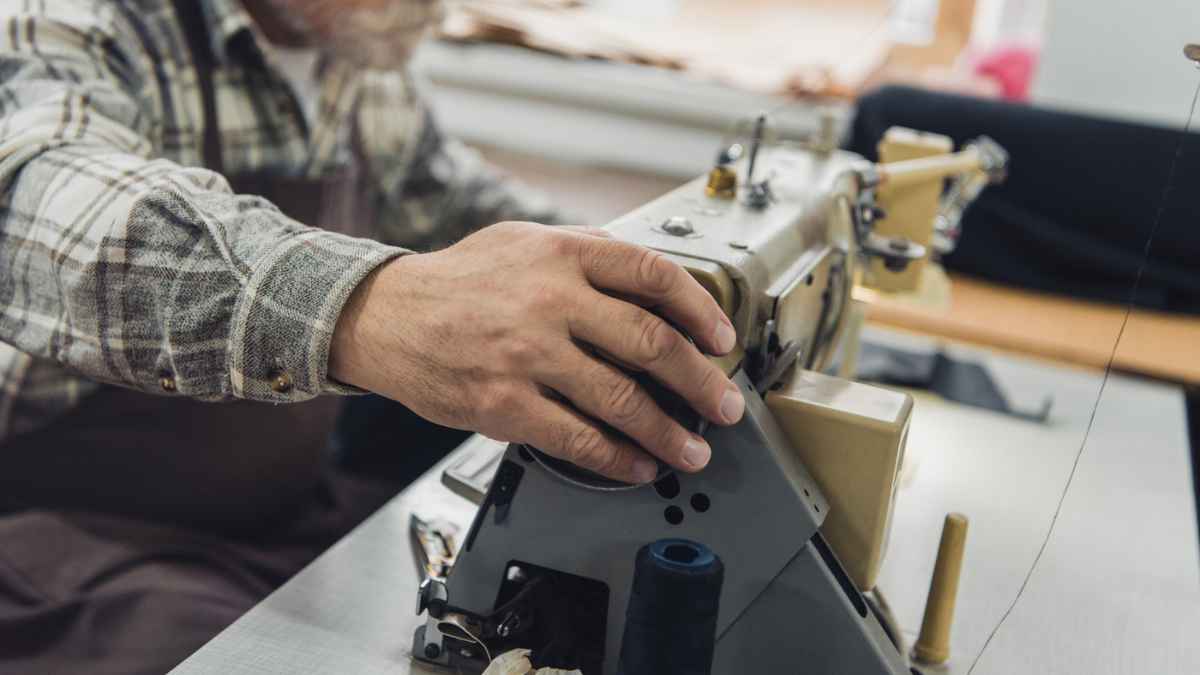Have you ever kept expired canned goods in the pantry or watered-down shampoo just to squeeze out every last ounce? Those are subtle signs of a childhood shaped by financial hardship.
For some, being extremely conscious about throwing anything away, even furniture older than you, or collecting coupons as if your life depended on it, are familiar habits. These experiences not only impact our relationship with money but also influence our approach to everyday life, making us more resourceful and resilient.
Read on to discover the telltale signs shared by those who have lived through financial struggles.
1. Patching Up Clothes

Sewing over spending? Patching your clothes for years might be a sign you grew up mending, not shopping.
For some people, it’s about making things last and not spending money on new stuff all the time. Being able to fix and reuse clothing teaches the value of being thrifty and self-reliant.
2. Utility Disruptions

Ever scramble by candlelight because the power’s out…again? Utility cut-offs, whether it’s the lights, the water, or the heat, are a tough reality for those who grew up facing financial challenges.
They’re not just inconvenient (nobody wants a cold shower at sunrise), they’re a constant reminder of the financial tightrope walk you’re on. Going through these challenges teaches you to be resourceful in difficult situations.
3. Soap Savings

We’ve all been there: Flipping a near-empty soap bottle upside down to lure out the last drops. Mixing water with the bubbly remains is almost a rite of passage for some.
To someone who grew up poor, wasting even a bit feels wrong. It becomes a habit never to waste resources, always finding ways to use every last portion.
4. Sharing Meals

Ever find yourself strategically scooping cereal with a fork to avoid using all the milk? No shame!
For some folks, that wasn’t just a quirky habit, it was a creative strategy. It was all about stretching those groceries as far as they could go.
5. Learning to Fix Everything

When people can’t afford professional services, they often tackle repairs independently. They pick up skills and become their own mechanics, plumbers, or electricians to cut costs.
These experiences nurture a do-it-yourself mentality. They teach you how to troubleshoot problems, acquire new skills, and maintain self-sufficiency even in tough circumstances.
6. Layering Up Indoors

Wearing multiple layers of clothing at home can help you stay warm during the winter without cranking up the heat and increasing your bill. It’s a smart way to stay cozy while sticking to a tight budget.
This habit teaches early lessons in saving and self-discipline. It also helps you understand the importance of saving and how small actions can affect your finances.
7. Simple Meals

A plate of rice flavored only with soy sauce can be a complete meal for those accustomed to making do with less. Simple, cheap meals symbolize simplicity and over luxury.
Such a simple meal represents making the most of what you have. It teaches the value of finding contentment in simplicity.
8. Being “Sick” on Field Day

Have you ever pretended to be sick to avoid not having the right gear or money for school events? This tactic helps students avoid feeling awkward or left out because they lack the necessary resources.
Through this strategy, kids are able to handle the stress of not fitting in because they don’t have enough money. It also shows how tough it can be when your friends have more money.
9. Free Food

Turning down free food isn’t an option when you’ve lived in poverty. It’s considered a blessing and a practical benefit—one doesn’t simply pass by without taking advantage.
After all, free food could mean one less meal to worry about. Accepting help becomes a key part of survival.
10. Menu Choices

Automatically ordering the cheapest item on the menu comes from the need to save money. It’s a habit that often sticks around, even when no tight budget exists.
Such practice shows a deep-rooted sense of frugality. It also highlights a person’s ability to prioritize needs over wants.
11. Recycling Cans

Growing up, finding pop cans to redeem for 10 cents each was a small fortune. Such a habit reflects the ability to see value in what others might easily discard.
It teaches us the importance of resourcefulness and the value of every penny. It also promotes environmental awareness by showing how a recycling habit helps the planet.
12. Helping Hands

Offering help with moving isn’t just a kind act; for some, it reflects the communal spirit fostered in low-income neighborhoods. When you’ve had less, you understand the value of mutual help.
The sense of community often becomes a lifeline, leading to strong bonds and an unspoken agreement to support others in their time of need. Such helpfulness can create a ripple effect of kindness, strengthening the entire community.
13. All for One Bread

Using regular bread as buns for everything is a display of resourcefulness. It turns a single product into a versatile solution, removing the need to purchase specific types.
Being flexible shows creativity in using what’s available and getting many benefits from a single resource, which increases its value.
14. Hoarding Gift Bags

People who grew up with less often see the value in repurposing everyday items. Instead of throwing things away, they find new uses for sturdy gift bags and plastic containers.
Using one material in multiple ways reduces waste, saves money, and encourages creativity.
15. Moldy Food

If part of the food was moldy, you didn’t throw it all away; you removed the spoiled bit and ate the rest. This practice highlights how every scrap was, and often still is, valuable.
As long as it was edible, no snack was considered too insignificant to conserve. It shows how important it is to minimize waste.
16. Breakfast for Dinner

Serving breakfast foods like pancakes, eggs, or cereal for dinner is more of a necessity than a choice. These ingredients usually cost less and can feed more people.
For some families, this also means they must save one meal for the day, extending resources even further. It’s about making meals stretch to fit the budget.
17. Monetary Guilt

Children often feel guilty when asking their parents for money, even a small amount. Knowing their parents are juggling many challenges, they try not to ask for things, even if needed.
They become mindful of their family’s financial strain. Awareness makes them hesitant to add any extra burden.
18. Reusable Mindset

Washing plastic bags and aluminum foil for other uses is common among those who grew up making the most of every item. Recycling conserves resources and provides an economic advantage for those in need.
It’s a practice of efficiency and sustainability at home. This habit ingrains the value of resourcefulness in everyday life.
How To Get Rich From Nothing: 20 Ways To Get Wealthy in 2024

How often have you heard, seen, or watched “rags to riches” stories? It’s a popular trope because it often happens to people in real life. You, too, can be one of them once you learn how to get rich from nothing.

Darlene Aberin is a seasoned digital marketer, adept content writer, and has credentials in the medical field. With a background in both the Bachelor of Science in Nursing and a Diploma in Midwifery, she brings a unique blend of clinical knowledge and practical insights to her work. After working in the field for 4 years, she recognized her true calling was writing. With her innate ability to analyze and transform trends into valuable content, she weaves a compelling digital narrative for every piece she writes. Darlene has written content for numerous magazines and websites, including The Gaggler and the International Drivers Association. When she isn’t mastering her craft, you can find her submerged in the riveting tales by Rick Riordan or J.K. Rowling’s Harry Potter series.

